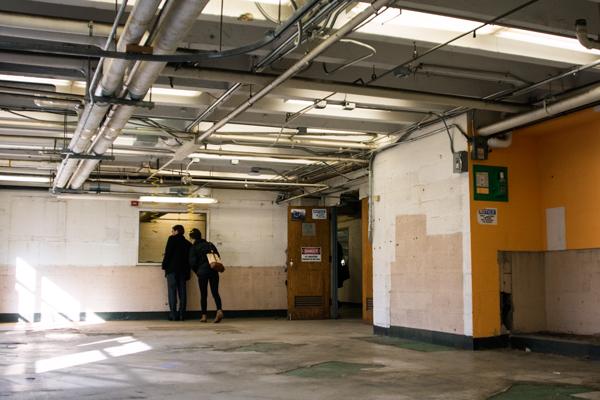An empty space in the basement of Tompkins Hall will soon be a place for brainstorming and cross-disciplinary collaboration.
The Office of Innovation and Entrepreneurship hosted an open meeting last week to get student feedback on how to develop GW’s first innovation incubator that will open as soon as the upcoming spring semester. Students who attended the open meeting said they hope the space will be somewhere students from different schools and fields can work together.
Jim Chung, the associate vice president for innovation and entrepreneurship, said in an email that he wants the innovation incubator to be a place for students interested in innovation and entrepreneurship to meet and brainstorm. He added that students who are already working on research projects could use the space to work, hold meetings and get assistance from staff.
Chung said he also plans to use the floor as a small space for tinkering and developing prototypes, and that his office will host workshops and events there.
“Students interested in innovation and entrepreneurship need a space where they can meet like-minded students from other disciplines to generate ideas and work on their ventures,” Chung said. “The new incubator will be a crucial part of the GW innovation ecosystem and will serve as a focal point to bring ideas, people and programming together.”
The space will be designed based on student input, but Chung expects it will include a meeting room, movable desks and chairs, whiteboards and equipment to work on inventions, he said.
The basement, which has not yet been renovated, has bare walls, a concrete floor and ceiling and no furniture. At the meeting, students and entrepreneurship and innovation staff discussed the different types of desks and technology that students would need in the space, like outlets that hang from the ceiling, group desks and whiteboard walls.
“We definitely are using student opinions and are hoping that it will be largely student-run,” Chung said.
Chung said the funds to build the innovation incubator are primarily coming from alumni donations. The Office of Innovation and Entrepreneurship will run programming and operations for the space, he said.
After the incubator is established, Chung said that the office will still solicit donations and look for additional sources of funding to continue developing the space.
University leaders have focused on innovation and entrepreneurship in recent years: Chung has spearheaded projects including a multimillion dollar grant from the National Science Foundation to develop the D.C. Innovation Corps, and research officials have pointed to an increase in patents from faculty and staff as a source of revenue and prestige.
In 2012 the University established a 10-year strategic plan with goals of increasing interdisciplinary opportunities and research. This year, officials announced progress in collaboration among GW’s schools with an increase the number of students majoring or minoring in school other than their home schools.
Lex McCusker, the director of student entrepreneurship programs, said he hopes to see the space used as a place of collaboration for students in every school.
“I want to see students from every GW school gathering in this space, and meeting each other around and working on interesting ideas, “ McCusker said. “I love GW to death, the school structure kind of keeps students in their own school, and entrepreneurship is a team sport.”
McCusker said he estimates it will take until January to get the space cleaned up and organized, and students should be able to use it later in the spring semester.
Sarah Shavin, a sophomore entrepreneurship major in the business school who attended the meeting, said she hopes to see the space used among students from every major and interest, so that students are exposed to what other students are working on.
“The biggest thing that I really focus on is how do we bring more engineers and artists together and how do we encourage collaboration but also foster it,” Shavin said. “So for me what I really want to see out of this space is connection, community and people together.”
Hannah Finkel, a junior and the vice president of operations for the TAMID Group, a nonprofit organization that helps undergraduate students develop professional skills by interacting with the Israeli economy, said her organization has been able to bring business, engineering and liberal arts students together to innovate. She said she hopes the space will help that kind of collaboration continue.
“We do consulting projects for start-up companies, and we work with companies that are out of Israel,” Finkel said. “Our main interest in this space is taking what we do and making it, like being able to be that bridge.”
innovation incubator








